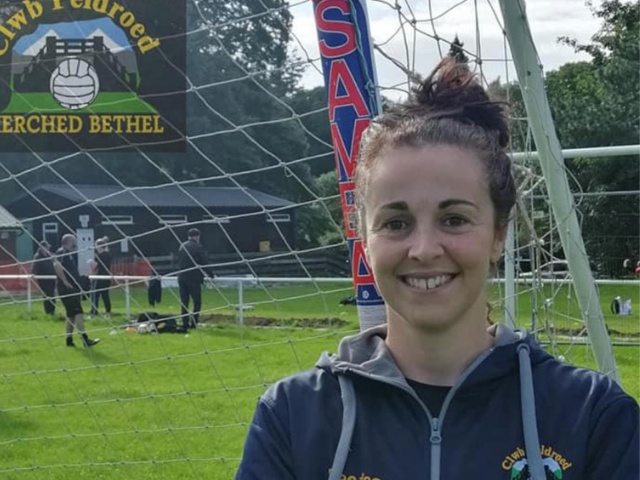
No need to imagine with imaging: meet the north Wales researcher leading the way in radiography studies
“When I tell people about diagnostic radiography, they’ll often reply saying ‘So you just take pictures?’ Of course there’s much more to it than that!”
Dr Jenna Tugwell-Allsup, 35, is a research radiographer at Betsi Cadwaladr University Health Board and honorary lecturer at Bangor University. When she’s not delivering research and supporting improvements in care, Jenna lives in Llanllechid with her husband and two children. She also plays football and netball for Division 1 teams Bethel Ladies FC and Tim o Walis.
“When we explain what we do to patients,” says Jenna, “We’ll sometimes say that we use specialised cameras to see what’s happening inside the body using ionising radiation. What we really do is produce high quality images which will help doctors with their diagnosis. Radiography is vital because without imaging such as an X-ray, MRI, ultrasound, or CT scan, it is difficult for doctors to diagnose diseases and injuries.
“I first got a taste for doing research during my undergraduate degree at Bangor University, where I needed to complete a research project for my dissertation. It introduced me to the idea that there are many things in healthcare that we still don’t have an answer for. The idea that I could discover something new, which could also help people, really excites me.”
After Jenna graduated, she worked for four years as a radiographer, specialising in MRI scans at Ysbyty Gwynedd in Bangor. Then in 2012, Jenna became a research radiographer for Betsi Cadwaladr University Health Board supported by Health and Care Research Wales.
For a decade Jenna’s focus has been supporting and delivering research in north Wales. This includes her own radiography research and supporting other studies that rely on radiography services, for example cancer clinical trials.
Make a big difference
“A really fulfilling study I led on was based on what I’d seen from my years working in MRI, where I met patients who were very anxious before and during their scan. Some patients were claustrophobic and the idea of lying down inside the confined space of an MRI machine for a prolonged period scared them. Some patients would refuse to have a scan completely, which has a big impact on their diagnosis and treatment. Anxious patients also tend to move more during a scan, which can cause images to be blurry and less useful for making a diagnosis. I thought research could explore ways of improving their experience and help staff to understand what was making patients most worried.
“Welsh is my first language, so I created a bilingual video for patients to watch before arriving at the department, explaining what an MRI scan involves, why we ask so many safety questions, what noise to expect, and the importance of staying still during the scan. The anxiety of this group of patients was then compared with others who received the routine approach, which is just an information sheet with the appointment letter. Patients were interviewed and filled in questionnaires about their experience.
“The research revealed that simply giving patients a video link to watch before an MRI scan reduced their anxiety and I still get requests from all over the UK for this link. It shows that for many patients, it’s fear of the unknown that makes the situation worse. Listening to patient experiences and increasing staff awareness of their needs can make a big difference to many aspects of care.”
Research pushes the barriers
“During the pandemic, I worked with another research radiographer, Bethan Owen, to support the National COVID-19 Chest Imaging Database. This involved sending anonymous chest X-rays of COVID-19 positive patients to the NHS England AI Lab to contribute towards a better understanding of how the virus affects the lungs. When it was safe, we then continued to recruit patients into a trial which explored the use of MRI in the management of ovarian cancer. The next research projects I’m working on will involve artificial intelligence (AI) and how this new technology can benefit patients. The MIDI trial, which is currently recruiting patients, is testing if an AI tool can identify abnormalities on MRI head scans.
“Research pushes the barriers of what we think we know. Just because we are doing something well, doesn’t mean we cannot do it even better. I hope my research, however small the project, has guided and influenced others in radiography to think critically about the way we work and how we can continually improve care. Without research, everything we know about caring and treating patients would just be an assumption. We need evidence to prove what is better for patients and that’s what I am passionate about.”
Find out more about the people behind the research and how Welsh research has changed lives
To get the latest research news in Wales straight to your inbox, sign up for our weekly bulletin